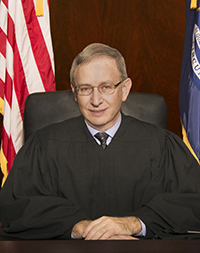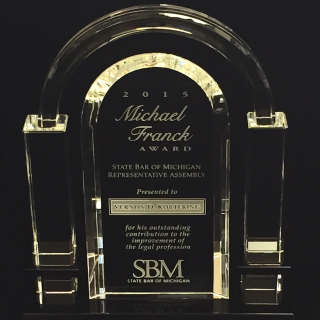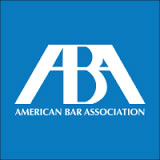Nearly 300 police agencies that work to protect more than 80 percent of Michigan’s citizens have now adopted scientifically sound eyewitness identification guidelines recommended by a task force convened by the State Bar of Michigan in 2011.
"Misidentification played a key role in the wrongful conviction of each our clients, who were exonerated years later through DNA testing,” said Marla Mitchell-Cichon, director of the Cooley Innocence Project at Western Michigan University Cooley Law School. “With law enforcement agencies across the state adopting evidence-based identification practices, the reliability of identifications increases and the risk of wrongful convictions decreases. Kudos to the Michigan law enforcement agencies that have implemented reform in this area."
Eyewitness misidentification is the leading cause of wrongful convictions proven with DNA evidence in the United States, playing a role in 71 percent of such cases. In Michigan, 18 of the 66 wrongful convictions that have been overturned since 1989 involved erroneous eyewitness identification, according to the University of Michigan Law School National Registry of Exonerations database, which tracks both DNA and non-DNA exonerations.
In 2011, the State Bar of Michigan convened the Eyewitness Identification Task Force, chaired by Valerie Newman, an attorney with the State Appellate Defender Office, and Nancy Diehl, a retired Wayne County prosecutor. The task force contained judges, sheriffs, Michigan State Police officers, police chiefs, prosecutors, defense attorneys and Innocence Project attorneys.
For a year, the task force reviewed research and listened to experts, then it issued an eyewitness identification policy writing guide for law enforcement agencies that recommended the use of evidence-based procedures that have been endorsed by the National Academy of Sciences, the International Association of Chiefs of Police and the American Bar Association. This guide focused on four key reforms:
- Having officers who conduct lineups conduct them in such a way that they are unaware of the suspect’s identity or they are prevented from seeing which suspect is being viewed by an eyewitness at any given time
- Instructing the eyewitness that the perpetrator may or may not be present during the lineup procedure
- Selecting fillers (non-suspect members of a lineup) that generally match the eyewitness’ description of the perpetrator
- Asking the eyewitness to state his or her level of confidence immediately after identification is made
"These best practices will help prevent wrongful convictions in the state of Michigan,” Nancy Diehl said. “I'm proud that our task force brought together a range of criminal justice stakeholders – judges, prosecutors, defense attorneys, law enforcement and the innocence community – to help our state adopt scientifically-based procedures that will reduce the risk of eyewitness misidentification."
"As a criminal defense attorney I have represented innocent people imprisoned based on a mistaken eyewitness identification,” Valerie Newman said. “The adoption of scientifically based eyewitness identification best practices is a very proud moment for Michigan's criminal justice system. These reforms are a major accomplishment achieved after thoughtful research and investigation into improving one aspect of our system. I look forward to continued progress on additional reforms to our criminal justice system."
The Michigan Commission on Law Enforcement Standards (MCOLES), Michigan Police Chiefs Association and Michigan Sheriffs Association worked to train officers in best practices and to help agencies that adopt the policy recommended by the SBM Eyewitness Identification Task Force. Follow-up surveys showed that nearly 300 agencies covering more than 80 percent of the state’s population had adopted evidence-based written policies, including the Detroit Police Department and Michigan State Police.
Michigan is now one of 19 states nationally that has achieved statewide implementation of eyewitness identification best practices, either through statute, court action or substantial voluntary adoption by law enforcement.
“In all of my years as a police officer I never knew of any officer who intentionally tried to convict the wrong person,” said David Harvey, executive director of (MCOLES). “Mistakes unfortunately occur as the profession is based on people and people make errors. Law enforcement in Michigan readily adopted the new policy to ensure that the right person is brought to justice and I am very proud of our agencies and officers for that.”
“The Prosecuting Attorneys Association of Michigan is most pleased that the procedures utilized in eyewitness identification in criminal investigations has been successfully addressed through the refinement and utilization of scientifically supported best practices,” said Mark Reene, president of the Prosecuting Attorney Association of Michigan. “The objective, as always, is that the most accurate information possible be obtained at all times to ensure justice for both victims and suspects. All interests have been furthered through this extraordinary collaborative effort.”
“The Michigan Association of Chiefs of Police was proud to have participated in developing and implementing this Model Eyewitness Identification Policy,” said Bob Stevenson, executive director of Michigan Association of Chiefs of Police. “We are confident that this policy will reduce the likelihood of an innocent person being accused of a crime. The cooperation of all the various participants within the criminal justice field to achieve this goal could be a role model for other states to emulate.”


 The State Bar of Michigan Lawyers and Judges Assistance Program will host a training program for providers called, "The Digital Age's Public Health Crisis: Sex and Porn Addiction," at 9 a.m. on Friday, March 17 at the State Bar of Michigan Michael Franck Building, located at 306 Townsend St. in Lansing.
The State Bar of Michigan Lawyers and Judges Assistance Program will host a training program for providers called, "The Digital Age's Public Health Crisis: Sex and Porn Addiction," at 9 a.m. on Friday, March 17 at the State Bar of Michigan Michael Franck Building, located at 306 Townsend St. in Lansing.  State Bar of Michigan members get a special $150 discount to ABA TECHSHOW, which will take place March 15-18 at the Hilton Chicago. To get the discount, register for ABA TECHSHOW and use this discount code: EP1701.
State Bar of Michigan members get a special $150 discount to ABA TECHSHOW, which will take place March 15-18 at the Hilton Chicago. To get the discount, register for ABA TECHSHOW and use this discount code: EP1701.  Michigan State University Law School will host an interactive workshop to help law students, lawyers and legal services providers improve their professional use of social media, whether you are beginner or a pro. During the workshop, you will learn from Kevin O’Keefe, attorney and CEO of LexBlog Network about how to effectively utilize social media to build a personal brand, establish expertise, and build an online community. The workshop is open to law students, lawyers, academics, judges, court staff and all other legal service delivery professionals.
Michigan State University Law School will host an interactive workshop to help law students, lawyers and legal services providers improve their professional use of social media, whether you are beginner or a pro. During the workshop, you will learn from Kevin O’Keefe, attorney and CEO of LexBlog Network about how to effectively utilize social media to build a personal brand, establish expertise, and build an online community. The workshop is open to law students, lawyers, academics, judges, court staff and all other legal service delivery professionals. The Michigan Supreme Court voted unanimously to elect Justice Stephen Markman as the next chief justice.
The Michigan Supreme Court voted unanimously to elect Justice Stephen Markman as the next chief justice.  Nominations are being accepted for two State Bar of Michigan Representative Assembly awards. The Michael Franck Award is given annually to an attorney who has made an outstanding contribution to the improvement of the legal profession. The Unsung Hero Award is presented to a lawyer who has exhibited the highest standards of practice and commitment for the benefit of others.
Nominations are being accepted for two State Bar of Michigan Representative Assembly awards. The Michael Franck Award is given annually to an attorney who has made an outstanding contribution to the improvement of the legal profession. The Unsung Hero Award is presented to a lawyer who has exhibited the highest standards of practice and commitment for the benefit of others. The Michigan State Bar Foundation has hired Jennifer S. Bentley as its next executive director.
The Michigan State Bar Foundation has hired Jennifer S. Bentley as its next executive director.  Nominations are now open for major State Bar of Michigan awards that will be presented at the September 2017 Annual Meeting in Detroit.
Nominations are now open for major State Bar of Michigan awards that will be presented at the September 2017 Annual Meeting in Detroit.  Nominations are now open for major State Bar of Michigan awards that will be presented at the September 2017 Annual Meeting in Detroit.
Nominations are now open for major State Bar of Michigan awards that will be presented at the September 2017 Annual Meeting in Detroit.  The American Bar Association Veterans Legal Services Initiative Commission and the Standing Committee on Legal Assistance for Military Personnel will co-host a free webinar, "Establishing and Enhancing Legal Clinics to Serve Veterans," at 1 p.m. on Dec. 14.
The American Bar Association Veterans Legal Services Initiative Commission and the Standing Committee on Legal Assistance for Military Personnel will co-host a free webinar, "Establishing and Enhancing Legal Clinics to Serve Veterans," at 1 p.m. on Dec. 14.